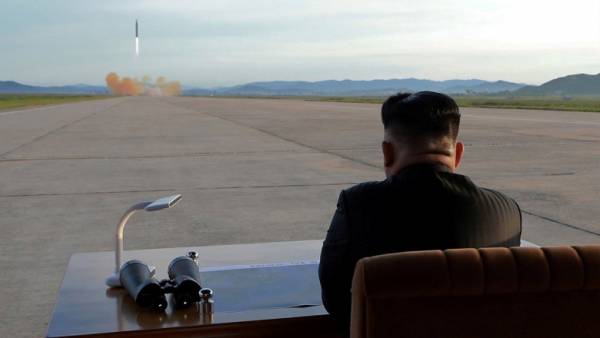The Ghost of Gaddafi over Pyongyang
The first ever meeting of the heads of the U.S. and North Korea Donald trump and Kim Jong-UN was under threat: Pyongyang strongly dissatisfied with the statement of the adviser to the head of the White house national security John Bolton.

Adviser to the head of the White house national security John Bolton recently said that he wanted nuclear disarmament of the DPRK, “the Libyan scenario”, that is, unconditional surrender nuclear weapons without concessions from the other side. The foreign Ministry of the DPRK saw this as a threat “to compel our worthy the Republic to the bitter fate of Libya and Iraq.” It is not excluded that John Bolton deliberately working for the failure of the incipient negotiation process: his personal conflict with the DPRK lasts for more than 15 years, during which the parties have already repeatedly call each other “tyrannical dictatorship” and “human mold”.
Libya on the trail of the DPRK
Review of John Bolton live on Fox News Sunday on April 29 could hardly be called useful for diplomatic dialogue with the DPRK. Pyongyang in recent months has taken unprecedented steps to show its willingness to discuss reducing tensions on the Korean Peninsula and nuclear disarmament. The most notable step was the elimination of the impending nuclear test site the Pung-Ri, which tested nuclear warheads. May June 12 in Singapore to Donald Trump and Kim Jong-Ynu will be able to agree on further steps in this direction, but that the meeting should take place.
In the meantime, the statement John Bolton was seen in Korea so that the United States intends to disarm their country, and then make it a mutiny and physically destroy the leadership of “the Libyan scenario”.
However, in 2003-2004, when liquidated nuclear program Libya, nobody is seen as a prelude to the overthrow of the Libyan regime. Its history can be traced back to the early 1980-ies, when Soviet assistance in the Libyan city of Tadjoura was built at the nuclear research Center. For its 10-megawatt research reactor (unable to enrich uranium to weapons grade) and related studies was purchased 2 tons of uranium. It is worth noting that in 1975 Libya signed the Treaty on the nonproliferation of nuclear weapons as a state, they do not have.
Own personnel and technology are not enough, and Libyan leader Muammar Gaddafi did in the 1970s several attempts to buy nuclear weapons from China or to establish technological cooperation on this topic with Pakistan or India. Attempts have not crowned success. Not accepted were the proposals of the USSR to build in Libya for $10 billion reactors on “heavy water”. In many cases, potential exporters pressured the Americans: since 1979, Libya is on the U.S. list of state sponsors of terrorism, and in 1981, the Washington shut down the Libyan Embassy in the United States. Reason was: Mr Gaddafi has systematically supported the Arab terrorist group and was involved in terrorist attacks in Western Europe. The most notorious case was the detonation of a Boeing 747 over Lockerbie, UK in 1988, which killed 270 people.
The first success of Libya was to strengthen ties in the nuclear field with Argentina, anti-Western sentiment which increased after the Falklands war of 1982. The real breakthrough happened in 1989 when the establishment of close cooperation finally agreed Pakistan, came up close to creating its own nuclear weapons. Thanks to Pakistani nuclear scientist Abdul Qadeer Khan to Libya in the early 1990-ies were the first 20 centrifuges capable of producing fissile materials for nuclear weapons. In parallel, continued large-scale purchases of uranium. According to some, in 2001-2002, through Abdul Qadeer Khan, Libya had purchased the drawings, which allowed to build its own bomb.
The threat of a unipolar world
However, according to the memoirs of an American diplomat from the Clinton administration Martin Indica, in 1999, Muammar Gaddafi began to look for ways to weaken international and U.S. sanctions seriously tougher in the 1980s and 1990s. According to the memoirs of former Libyan foreign Minister Abdel Rahman Shalgam, the final decision to disarm Muammar Gaddafi has since received in 2001 the message from the new President of the USA George Bush.
Mr. Bush demanded that Libyan leader to “immediately destroy all weapons of mass destruction (Libya in this moment also bought components of biological and chemical weapons on the black market.— “B”), otherwise, the United States will destroy all without talking”.
After that, according to the former Minister, Libyan officials began to meet secretly with representatives of the USA, UK and Russia to discuss the prospects of rejection of the accumulated nuclear weapons. Its not, strictly speaking, was to bring together drawings, uranium and rockets are still hampered by the lack of qualified engineers and experience.
The efforts of Muammar Gaddafi has intensified dramatically after the U.S. invasion of Iraq in 2003: he sent to Washington, London and Moscow envoys, who had offered to give the countries concerned with all the details of Libya’s nuclear, chemical and biological programs. They were invited to visit ten key objects of military programs in Libya. The greatest interest was shown by the Americans, who in 2004 brought 25 tons of documents and equipment from Libya, including about 1 thousand centrifuges for uranium enrichment. Muammar Gaddafi has stated that doing it for “return to international institutions and for the benefit of the Libyan people” which was supported by all Western countries.